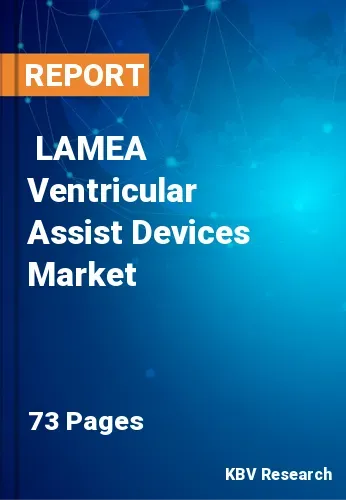The Latin America, Middle East and Africa Ventricular Assist Devices (VADs) Market would witness market growth of 12.9% CAGR during the forecast period (2018 – 2024). Ventricular assist devices are implantable mechanical pumps used in controlling the blood flow from ventricles of heart to the rest of body. These devices replicate the functioning of ventricles and are implanted to the end of heart and to help the flow of blood from ventricles to the body. The major factors that drive the growth of the global ventricular assist devices market are growing patient’s pool with heart failures and shortage of heart donors. Additionally, the technically advanced VAD (DuraHeart, HeartMate III) are devices that add to the market growth.
Based on Product, the market is segmented into Left Ventricular Assist Devices (LVADs), Right Ventricular Assist Devices (RVADs) and Biventricular Assist Devices (BIVADs). Based on Design, the market is segmented into Implantable Ventricular Assist Devices and Transcutaneous Ventricular Assist Devices. Based on Application, the market is segmented into Bridge-to-transplant (BTT) Therapy, Destination Therapy, Bridge-to-recovery (BTR) Therapy and Bridge-to-candidacy (BTC) Therapy. Based on countries, the market is segmented into Brazil, Argentina, UAE, Saudi Arabia, South Africa, Nigeria, and Rest of LAMEA.
The market research report covers the analysis of key stake holders of the market. Key companies profiled in the report include Berlin Heart GmbH, Cardiac Assist, Inc. ( LivaNova), HeartWare International, Inc., Jarvik Heart, Inc., Reliant Heart, Inc., Abbott, Sun Medical Technology Research Corp., Syncardia System, Inc., Thoratec Corporation and Abiomed
Scope of the Study
Market Segmentation:
By Product
By Design
By Application
By Country
Companies Profiled
LAMEA Ventricular Assist Devices Market - Get online access to the report

Get Real Time Market Insights
Our team of dedicated experts can provide you with attractive expansion opportunities for your business.

